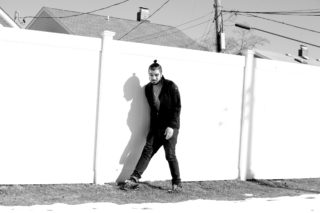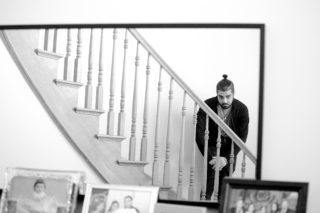Heems has made a deeply personal and political record about the sorry regression of race relations in the US
The former Das Racist star on living in America as a member of a vilified community

The former Das Racist star on living in America as a member of a vilified community
Since the mind-boggling brilliance of Kendrick Lamar’s ‘To Pimp a Butterfly’ landed in all our ears this month, along with the depressingly foul response to Kanye West’s Glastonbury headliner announcement, it’s likely that most of 2015’s discourse around the politics of hip-hop will be consumed by these two, contextually seismic, events. However, in the same month a record was released that garnered much less worldwide media fanfare and drama – Heems’ ‘Eat, Prey, Thug’. In that record, however, we have perhaps one of the fiercest, most personal and political rap records of the year.
Heems is the solo project of Himanshu Suri, one-time member of the Queens-based alt-hip-hop group Das Racist. He has released some solo mixtapes, such as 2012’s ‘Nehru Jackets’, but this marks his first album release proper, and it weaves from the pop-leaning, Dev Hynes-featuring end of things, to the heavy melancholy that only too much self-analysis and a break-up can create. I spoke with him whilst he’s at SXSW, where not only is he playing shows but also featuring in a documentary and acting in a feature film that is screening there.
“It’s all fuelled by alcohol,” he tells me in a rare bit of downtime in Austin, whilst also taking in the hugely positive response to his album. “It’s amazing to actually see people buy the music because I’m used to putting it out for free.”
Within two minutes we are into the politics of the record, a political angle that comes from Suri’s position of being an Indian living in post-9/11 America. The attack on the World Trade Center is something that runs through the core of much of the record, or at least its on-going impact and detrimental fall-out on minority communities throughout the U.S. “It’s been a long time coming for a piece of work like this to come out,” he says. “9/11 is like this dark cloud that hangs over New York in the same way that, in certain communities of colour, things like mental health and alcoholism are just dark clouds that hang over families and they don’t talk about it.”
Despite this being an album that needed to come out, it was not without apprehension and anxiety on Suri’s part. “I mean, I’m not very confident at singing,” he says, “and some of the reviews – or one – did mention that. But yeah, to put myself out there and be so vulnerable is definitely different. As I’ve said in other interviews, I felt like I was hiding behind humour and samples [in Das Racist]… I always had trouble accepting that my story was important or that my voice was important and now I’ve come to a point where I have accepted that. Even if it is depressing, that’s the reality.”
Is it, I put to him, a case of it becoming increasingly impossible to have a sense of humour in regards to race relations and racism in the U.S right now?
“You know, honestly, I didn’t even think about that” he says, slightly taken aback, “but the thing that happened with Ferguson last year had a huge affect on me, personally. It was a personal thing; it really put a lot of weight on me. So, yeah, I think to a certain extent you can’t fucking jump around with these things anymore, you need to be straight forward and it’s exhausting sometimes trying to figure out the best way to approach these things and, like, educating the fucking white man on the experience of being a person of colour. It gets exhausting over the course of five years – it’s just, like, how can I get it out without beating around the bush?

“It’s not like a new thing,” he says of the palpable sense of tension in the air that’s followed Ferguson. “It’s like 9/11; it being this thing that happened 14 years ago but the fact that it resonates with people, that shows me that these are things that we see and deal with everyday.”
Much of ‘Eat, Prey, Thugs’ was recorded in Bombay, an environment in which race took on a different perspective for Suri. “Being out there, I didn’t have to think about race,” he says. “It’s like if I’m in a room over there, it’s just people: a poet, an artist, a musician, whatever. We we’re all Indian people doing this. It is different, though – on the one hand they don’t know what it’s like to not be an artist in a capitalist environment but, on the other, also to be an artist in a capitalist environment where there is racial undertones.
“You’re aware that you are in this system that you’re fighting against to make your art that is also embedded in whiteness in America, whereas in India they are rebelling against people who look like them and sound like them.”
Suri tells me that despite his exposure to racial tension – and flat-out racism – in the U.S it is not something that is universally shared in India. “They love it,” he says. “There’s this unfortunate lingering anglophilia from colonialism. The people that I encountered, typically, were either upper class or they were educated by college’s in America. Or they were my family who left India to go to America, not from poverty but the middle class. Their views of the west is so positive, it’s almost too positive. I’m the one who is critical of the west and people look at me like, ‘what’s wrong with you’, and I’m critical of India too. Most of the artwork that I’ve been making is about skin lightening creams and the hypocrisies and ideas of race in India.”
So in many senses the sort of American Dream mentality projected by America at large has succeeded in shaping the views of people from outside the country?
“I don’t think America projects it, I think immigrants do. Only politicians and immigrants talk about the American Dream; American’s take it for granted – and what is the dream? To just blindly be a capitalist? To have the boss that tells them what days to take off and when they can drop their kids off to school?
“I feel like American’s at this point don’t have any understanding of the American Dream because it’s normal to them. Immigrants are some of the most patriotic people there are, that’s the whole ironic thing. We’re – not we as in I, but my parents and my community – the ones who take the test and learn about American history and the way that congress works so that we can become a citizen and even then we’re not treated the same so what does citizenship mean?”
And does politicised rap music have an impact in India?
“Rap doesn’t really translate in India because rap is a working class medium, but the type of people who encounter music from the west in India are far from working class. So the ideals of punk and rap don’t resonate in India as much as I would like them to.”

Heems’ tracks, such as the superb ‘Flag Shopping’, manage – even in title alone – to hit home the deadly duo of patriotism and capitalism as a driving force for prosperity in a country. Says Suri: “It’s also about being a person of colour and how scary patriotism and capitalism are when you’re from a community that has consistently been exploited by those institutions.” However, the pinnacle of the album is the devastating post-9/11 closer, ‘The Patriot Act’. In one verse Suri breaks down, in angered and exhausted detail, the effects of that piece of legislation in a post-September 11th world, and the impact it has had on communities of ethnic minorities.
And so we rushed to buy flags for our doors.
Bright American flags that read “I am not Osama.”
And we ironed our polo shirts and we combed our hair.
And we proudly paid our taxes.
And we immediately donated to a local white politician.
And we yelled “I’m just like you” as quietly and calmly as we could.
So as not to raise too much attention and be labelled a troublemaker and lose one’s job.
Like when my name was too long to pronounce at work and raised too much attention.
And I was labelled a troublemaker, so I changed it.
“I say on that song, ‘Got what we ask for, someone to listen’, and I say that tongue-in-cheek about our phone’s being tapped – about our community being infiltrated, someone listening in on the phone. Yet as a community all we wanted was for someone to listen to us. The Patriot Act is still relevant and on the flipside my medium is rap, a black medium, and if you watch The Wire one of my favourite things in that is one of the FBI guys saying, ‘oh, I can get you those phone taps. Thank God for the Patriot Act!’ It’s actively being used to not only keep down brown, Muslim men but also black American’s. It’s just wide-blanket legislation that has reduced our privacy. It’s beyond the racial implications, it’s an Orwellian thing.”
What ‘Eat, Prey, Thug’ boils down to is a search for identity, both in terms of discovery and definition. It’s something that’s at the heart of all rap, according to Suri, who tells me: “Identity is constantly changing and an album is a snapshot of where you are and that’s why this album is particularly dark compared to my other ones.”
Adding to the darkness – beyond the sorry state of race relations in modern America – is a recent romantic breakup. “The only way to experience the daily pain of being a person of colour in a country that constantly wants to put you down is what it’s like to have your heart broken in a real way,” says Suri. “So when I talk about socio-political heartbreak it’s romantic heartbreak because that’s almost the only way to explain how emotionally exhausting and how painful it is to fucking live as a person of colour [in the U.S.]. So in some way the break-up stuff isn’t that different from the political shit, it’s all one and the same.”
As ‘The Patriot Act’ fades out the album it is punctuated with a small, pithy and deeply sarcastic – yet also fatigued – laugh. It is a very brief state that allows Suri to laugh at the absurdity of such an unrelenting cyclical situation before that laughter resumes to resignation and the album dies, knowing that the cycle will continue. The laugh is essentially a cry. Of course it is symbolic, and what hits home so poignantly and intensely about ‘Eat, Prey, Thug’ as a whole is, as Suri pointed out earlier about Ferguson, it’s not that these revelations are new to us; not that this record is exposing a rancid, deep-set prejudice that has spawned in modern-day society; but that this is still fucking going on in 2015.